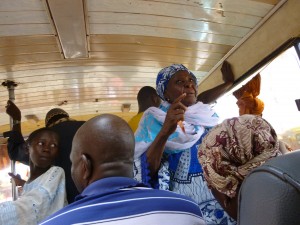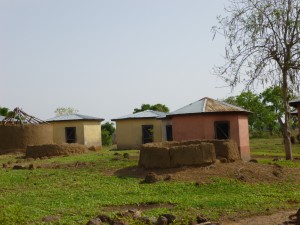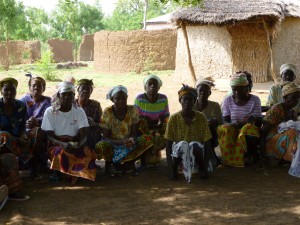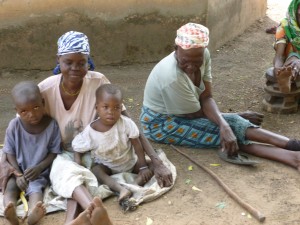Kpatinga: Another ‘Witch’ Village in Ghana
I just returned from Kpatinga, another village in northern Ghana where alleged witches take refuge. One unique thing about witchcraft belief in Northern Ghana is that there are safe spaces for ‘witches’. A ‘witch’ must not be suffered to die as the scripture says. There are villages that welcome and rehabilitate victims of witchcraft accusations. Kpatinga is one of them. It is around 75 miles from the regional capital, Tamale. The major challenge to anyone visiting the ‘witch’ camp is access. Kpatinga is remotely located. To visit the village from Tamale one must stop over at Gushegu town. The journey from Tamale to Gushegu town is about 3 hours. Apart from the Metro Mass Buses, other commercial buses ply this route three times a day- in the morning, afternoon and evening especially on Gushegu market days. I arrived the bus station shortly before noon. I was told there were no more tickets. I stood there for some time contemplating cancelling the trip. I did not want to arrive Gushegu in the night.
A few minutes later the young man who told me that the tickets had finished came around. He brought out a rough piece of paper from his pocket. The white paper had turned brown because of dust and dirt. Number 68 was written at the back of the ‘ticket’. He gave it to me and stretched out his hand asking for the bus fare. I stared at the ticket for a while. But a female student from Karga Senior High who was waiting to board the same bus told me it was a bus ticket.
I paid for it though I was thinking it might be one of those bus tickets with no seats. I was not ready to stand from Tamale to Gushegu. From my experiences traveling in Nigeria and Ghana, one does not ask for a refund of such ticket fares, that is if they are genuine tickets. As I suspected, there was no bus seat for number 68 . The last seat number was 48 or 51, I cannot recall exactly. I went back to the man who issued me the ticket. He told me to exercise patience and allow the ‘main’ passengers to board. Yes I was in for a journey of patience. My seat number was for the improvised seats on the aisle. He got me a place to sit down and wait for other passengers to board. As we were about to depart, I took my seat but lo and behold it was meant for two people. The other passenger was a woman. She was very fat. She tried squeezing herself to sit down without success. There were already two fat women sitting on my left and on my right. The ‘seat space’ was tight and could not take another fat person. One slim guy sitting in front of us volunteered to exchange his seat space with hers. We were now six passengers sitting in a row meant for four.
Before we left Tamale two hawkers came into the bus. They sold ‘medicine’ to the passengers. The first person was a man. He sold some herbal medicine manufactured in Accra! And later came a woman. She was over 70 but still agile. The woman had a loud voice. As soon as she entered the bus, she shouted Asaalam aleikum to gain the attention of passengers who were struggling to squeeze in themselves or their luggage. She was selling some ‘Islamic’ medicine from Mecca. I bought one of the Mecca medicines for spiritual attacks, bad dreams, evil spirits for inclusion in my ‘witchcraft artefacts’.
The bus was scheduled to depart by noon but we left a few minutes before 2.00pm. That was after every available space in the bus had been occupied by passengers and their luggage including some spaces around the driver’s seat. Those who could not find a place to sit stood throughout the journey.
The tarred section of the road ended a few kilometres after Tamale, and the rest was filled with potholes. There were patches of tarred road at the district headquarters along the way – at Savelugu/Nanton, Karga etc. It had rained a few days earlier, so the road was not dusty. At some points during the trip, there were so many potholes. The bus was shaking and quaking as if the vehicle would scatter and disassemble into parts at any moment. But it didn’t.
I was not surprised at all when a few kilometers to Gushegu our bus developed some fault. The driver tried to fix it. The vehicle needed more mechanical attention. But the driver managed it till we got to Gushegu around 6pm. I checked into the Guest House of the District Assembly after making arrangements for a moto bike that would convey me to Kpatinga the next day.
I arrived Kpatinga by 8.00 in the morning after a 40 minute ride. Sampa, the Tindana as the local earth priest is called in Dagbani, was waiting at the camp. Sampa dropped out at Primary 4 and has been working as the Tindana for over two decades. He understood some English but could not communicate effectively. We spoke through an interpreter, a teacher from a nearby school. Sampa could not say exactly when he started working as the Tindana. According to him, it was before the 1994 conflict between the Dagombas and the Konkombas. There are 42 alleged witches in the camp at Kpatinga. Nine children are staying at the camp with their mothers or grand mothers. Sampa explained that the ‘witch’ camp started ‘since Kwame Nkrumah regime’. The aim was ‘to save people suspected of witchcraft’. People accused of witchcraft are banished from their communities. Some of the accused flee on their own to avoid being killed. To be admitted into the camp, an alleged witch must be accompanied by family members or relatives. Sampa said emphatically that any alleged witch that arrived there without a family member or relative would not be allowed to stay.
An alleged witch gives a goat, a guinea fowl and a local chicken and 100 Gh Cedis to the Tindana. The goat and fowls are used to perform sacrifice to the gods. The sacrifice is used to ask the gods for spiritual protection of the alleged witch. The alleged witch is made to drink Nyuhima – a mixture of shrine water and the blood of the goat or fowl used for sacrifice – to cleanse or disable witchcraft powers the accused might have.
There is no ritual test to confirm the witchcraft powers as is the case in Kukuo camp.
Sampa made it clear that without presenting the goat and fowls, no alleged witch is admitted into the camp. The fee is not mandatory. Some of the alleged witches who could not afford it paid less, 40 Gh Cedi or whatever they could afford. This process applies when people come to take their family member away. Sampa refused to tell me how he conducts the sacrifice at the shrine.
The alleged witches in Kpatinga camp face so many challenges. They lack money, food, clothing, toilet facilities and electricity. But some NGOs have been helping address their needs. A faith-based NGO, World Vision, built small rooms for them. Many of the alleged witches occupy these rooms while others still live in huts. World Vision also installed a grinding machine for the women. Action Aid and Songtaba supply them clothes and cooking pots. Simon Ngotha’s Witch hunt Victims Empowerment Project provides them health insurance and hired a teacher who gives English lessons to the women.
Some of the alleged witches who are strong enough engage in farm work. Some help people who have big farms in farming and harvesting. They get some farm produce in return which they sell to gain some income. Some of the women I interviewed were unhappy with their situation at the witch camp. They want to go home. They want to go back to their families and communities but they cannot due to witchcraft allegations. Superstitions and various misconceptions about death and diseases are at the root of these allegations.
The allegations range from being responsible for deaths in their family, to inflicting people with sickness and appearing in people’s dreams. Some of the women were beaten before they were driven out of the community. Before coming to the ‘witch camp’, some fled to stay with family members who refused to accommodate them because of witchcraft related fears and stigma. Others came down to settle at the camp as soon as they were accused. Their family or community members are very angry and do not want to set their eyes on them again. These women have been forced to adopt Kpatinga as their home and community, as the only safe place to be and to live for now, if not forever.




